REPRINTED WITH PERMISSION FROM THE CHRISTIAN SCIENCE MONITOR
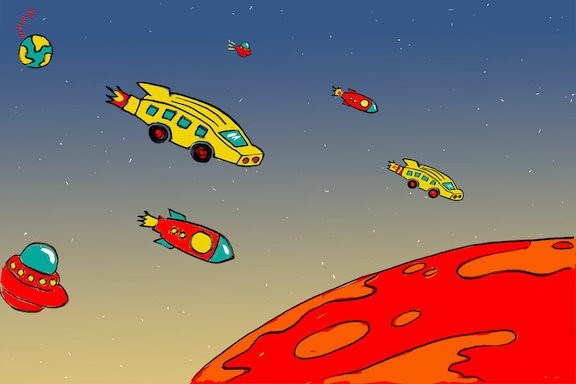 FutureKaren Norris/StaffOne student envisions a watch that tells you when you’re polluting – a sort of eco-nanny on your wrist.
FutureKaren Norris/StaffOne student envisions a watch that tells you when you’re polluting – a sort of eco-nanny on your wrist.
December 31, 2021
One student envisions a watch that tells you when you’re polluting – a sort of eco-nanny on your wrist.
Another suggests that teachers might show up in classrooms, not in person, but as holograms.
There’s talk of colonies on Mars, and people commuting in flying cars.
These are among the ideas to emerge from the fertile imaginations of fifth graders across the country thinking about what the world will – or should – look like in 20 years. As the calendar flips to a new year, the Monitor, in collaboration with The Hechinger Report – a nonprofit education news site – had reporters sit down with students in four cities to give us their predictions of and aspirations for the future.
At a time of unusual vitriol in society among grown-ups – on abortion, school curricula, election counts, you name it – we wanted to plumb the minds of youth who are becoming aware of the world but still retain an innocence.
What we found is that they harbor plenty of concerns about tomorrow, sure, but they also exude an innate optimism, a sense of delight and possibility. Their visions represent a journey into cybersecurity and space travel, racism and robots.
As you read through their comments, consider what you think will be happening in 2042 and then ask yourself: Am I smarter than a fifth grader?
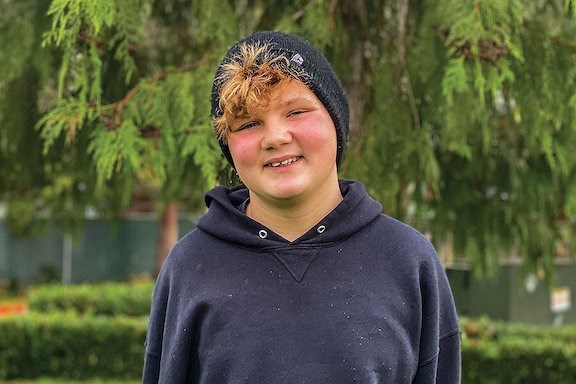 Lillian Mongeau/The Hechinger ReportOne idea, for when we colonize Mars, is that all of humanity could spend a few years on the Red Planet to let Earth “rest.” “And then when we come back, we’ll try better to not pollute as much.” – Chandler Stark
Lillian Mongeau/The Hechinger ReportOne idea, for when we colonize Mars, is that all of humanity could spend a few years on the Red Planet to let Earth “rest.” “And then when we come back, we’ll try better to not pollute as much.” – Chandler Stark
A kinder, cleaner world(s)
HILLSBORO, ORE. – One idea, for when we colonize Mars, is that all of humanity could spend a few years on the Red Planet to let Earth “rest.”
“And then when we come back, we’ll try better to not pollute as much,” says Chandler Stark, a fifth grader at Paul L. Patterson Elementary School in Hillsboro, Oregon.
Chandler estimates it will take two to five years for Earth to recover from what we’ve done to it, at which point we can all return. The idea was met with nods by three of Chandler’s classmates as they sat discussing the future in the principal’s office of their 400-student elementary school, a red-brick structure in a suburb of Portland. Part tech hub, part old farming town, Hillsboro is an increasingly diverse community.
Since Mars is not yet ready for human habitation, these kids agreed that cleaning up our current planet was a top concern.
“The time to fix it is now,” says Caden Sorensen. “It’s not going to fix itself. And if we do end up colonizing Mars, don’t ruin Mars, too.”
But while the technology necessary to move to Mars seems likely to be a net positive, these children aren’t interested in every new advancement.
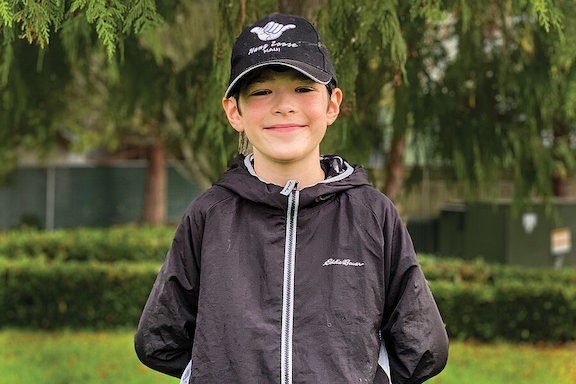 Lillian Mongeau/The Hechinger Report“The time to fix [Earth] is now. It’s not going to fix itself. And if we do end up colonizing Mars, don’t ruin Mars, too.” – Caden Sorensen
Lillian Mongeau/The Hechinger Report“The time to fix [Earth] is now. It’s not going to fix itself. And if we do end up colonizing Mars, don’t ruin Mars, too.” – Caden Sorensen
Technology “can bring really amazing good things, but those things could bring some other bad things,” Caden says, noting that he would warn his future children about the downsides.
Noelani Velasco Polley agrees. She hopes to one day own an iPhone 21, “with 21 cameras on it,” but for now she’s OK not having a phone at all. Her moms have warned her that phones can be hacked, so she’ll tell her future kids they have to wait, too. Noelani isn’t the only one worried about cybersecurity.
“I’m really concerned that there’s going to be more electronics ... that people can hack, so more identity theft,” says Fatima Abdi, who prefers to be called Fati. She also worries about artificial intelligence. (All four students say they think humanoid robots are “creepy.”) Fati worries racism will get worse, and thinks steps should be taken, short of going to Mars, to save the environment.
“I really hope electric cars become popularized,” she says.
“Yeah, I was going to say that,” Chandler chimes in. “I just hope we have more alternatives for things that pollute, and just have more ways of doing things without polluting the ocean and sky.”
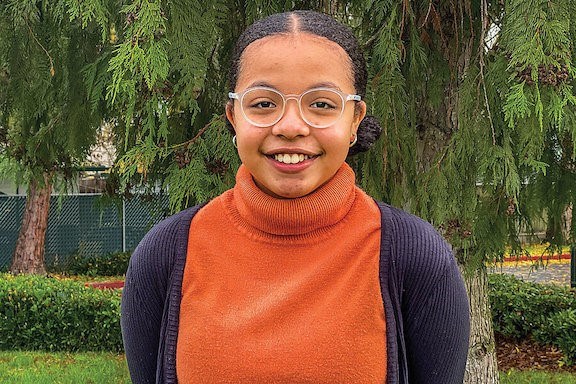 Lillian Mongeau/The Hechinger Report“I think there can be more equality in the world if we just work hard for it.” – Fatima Abdi, a fifth grade student at Paul L. Patterson Elementary School in Hillsboro, Oregon
Lillian Mongeau/The Hechinger Report“I think there can be more equality in the world if we just work hard for it.” – Fatima Abdi, a fifth grade student at Paul L. Patterson Elementary School in Hillsboro, Oregon
Chandler hopes to one day compose music for TV shows and video games. Fati plans to be a business owner – she already has an Instagram shop where she sells jewelry. Caden is currently aiming to be a lawyer, but figures he’ll probably change his mind. And Noelani wants to be a scientist or an engineer.
“I think there won’t be that many jobs in fast-food places” in the future, she says. “I think they’re going to be like, bigger jobs, and people are going to want to be in jobs where they can get more money, because in the future everything is going to be more expensive.”
Many jobs, the children predict, will be replaced by robots.
“I think there’s probably going to be like, no more jobs at factories and stuff, because robots can just do that,” Chandler says.
“Yeah, there’s going to be a lot of robots,” Noelani agrees.
Ultimately, though, they say the power to create the future rests in human hands.
“I think there can be more equality in the world if we just work hard for it,” Fati says. As an example, she points to the problem of homelessness vexing nearby Portland. If we “try to actually solve the problem, that could be done, and they could start a new life.”
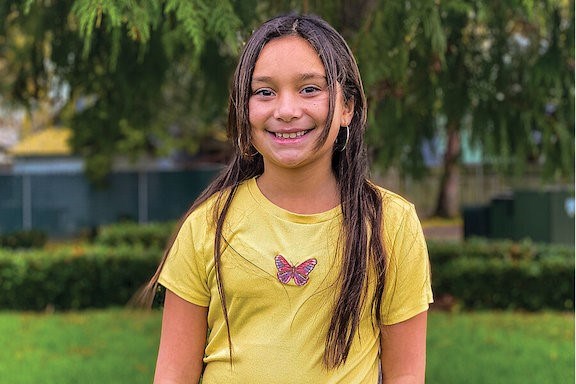 Lillian Mongeau/The Hechinger Report“Our generation is the future, and if we are all kind and loving to others, I think it could change the world.” – Noelani Velasco Polley
Lillian Mongeau/The Hechinger Report“Our generation is the future, and if we are all kind and loving to others, I think it could change the world.” – Noelani Velasco Polley
Noelani has already tried to address the issue locally. At her suggestion, she and her mother recently brought a pizza and a gallon of water to a person they’d noticed living near a highway overpass. He didn’t want them, but they found another person staying nearby who did.
“Our generation is the future,” Noelani says, “and if we are all kind and loving to others, I think it could change the world.” - Lillian Mongeau, The Hechinger Report
WOODBRIDGE, VA. – In 25 years, schools could be multiple stories, connected by elevators and moving walkways. Scientists will have made greater strides in exploring the uncharted ocean depths and the edges of the galaxy. Humans may even have settlements on other planets.
A group of six fifth-graders at Belmont Elementary School in Woodbridge, Virginia, about 25 miles southwest of the nation’s capital, hopes for a flashy world much different from their suburban town – as long as human progress is kinder to the environment.
“Hopefully we can use more renewable resources. Like solar power, windmills, and dams,” says Ethan Ong.
“I think we need to stop pollution, littering, and all of those things. We need to help the Earth,” says Anjelica Jabbie.
Jashua Alvarado adds, “We need to take care of planet Earth because it is a gift for us. Without our planet, we wouldn’t be able to survive or anything.”
Belmont Elementary’s 500 students themselves evoke a picture of the nation’s future: The school is part of the Prince William County school system, which serves one of the state’s fastest-growing counties. Prince William is also the most ethnically and racially diverse county in Virginia, and the 10th most diverse county in the country, according to the 2020 U.S. census. About two-thirds of the students at Belmont are Hispanic, 14% are Black, 9% are white, and 6% are Asian. About 77% are eligible for free or reduced-price lunches.
Belmont’s math and science focus fosters the students’ interest in the environment, as does their location: Less than 2 miles away is Occoquan Bay National Wildlife Refuge, a habitat for migrating birds and butterflies. At Belmont, fourth and fifth graders get extra lessons in STEM subjects, such as robotics and hands-on science experiments.
The coronavirus has affected the lives of these children since third grade – Prince William just returned to full-time, in-person learning this school year – but the fifth graders don’t like to imagine the pandemic in their future.
“Let’s hope the pandemic is over,” says Jason Rivera. Other viruses may appear, “but maybe not very big.”
Or maybe there will be more warning, Jashua says. “Scientists would be able to tell if a pandemic is going to come to the world like two years before, or one year, or – I don’t know – months,” she says.
The six students are chatting in an empty classroom at Belmont. They take each question seriously and answer thoughtfully.
That’s perhaps not surprising from a group of students who see themselves playing ambitious roles in building a new world in the future – as engineers, doctors, and scientists.
“My dad’s an engineer, and it seems really cool to build stuff, so I think I want to be an engineer,” Ethan says.
“I’m kind of a science nerd and my mom tells me if I want to be a scientist, I have to be working hard for it,” says Jashua.
Yanet Hundessa and Anjelica will be helping other people. “I really want to be a doctor because I want to help the elderly,” Yanet says.
“I also wanted to be an engineer or a doctor because I love helping people, and I love building things,” says Anjelica.
They also plan to take on problems that grown-ups are now leaving behind. “Why don’t we focus on other people that live in different places?” says Ethan. “There’s people that are poor that don’t have lots of resources and that don’t have food. See, we can turn on water so easily, but other people, they don’t have any.”
That prompts another round of predicting for the day when they’re in charge.
“People could donate to countries that have poor resources,” says Sam Aphayvong. “If the people didn’t get the resources they need, they could become jealous and start wars. If you donate, you can prevent wars and stuff.”
“I think people should be kind to each other,” Yanet says. “No racism, and they should help out poor people and everybody will be equal.” – Christina A. Samuels, The Hechinger Report
The coronavirus has affected the lives of these children since third grade – Prince William just returned to full-time, in-person learning this school year – but the fifth graders don’t like to imagine the pandemic in their future.
“Let’s hope the pandemic is over,” says Jason Rivera. Other viruses may appear, “but maybe not very big.”
Or maybe there will be more warning, Jashua says. “Scientists would be able to tell if a pandemic is going to come to the world like two years before, or one year, or – I don’t know – months,” she says.
The six students are chatting in an empty classroom at Belmont. They take each question seriously and answer thoughtfully.
That’s perhaps not surprising from a group of students who see themselves playing ambitious roles in building a new world in the future – as engineers, doctors, and scientists.
“My dad’s an engineer, and it seems really cool to build stuff, so I think I want to be an engineer,” Ethan says.
“I’m kind of a science nerd and my mom tells me if I want to be a scientist, I have to be working hard for it,” says Jashua.
Yanet Hundessa and Anjelica will be helping other people. “I really want to be a doctor because I want to help the elderly,” Yanet says.
“I also wanted to be an engineer or a doctor because I love helping people, and I love building things,” says Anjelica.
They also plan to take on problems that grown-ups are now leaving behind. “Why don’t we focus on other people that live in different places?” says Ethan. “There’s people that are poor that don’t have lots of resources and that don’t have food. See, we can turn on water so easily, but other people, they don’t have any.”
That prompts another round of predicting for the day when they’re in charge.
“People could donate to countries that have poor resources,” says Sam Aphayvong. “If the people didn’t get the resources they need, they could become jealous and start wars. If you donate, you can prevent wars and stuff.”
“I think people should be kind to each other,” Yanet says. “No racism, and they should help out poor people and everybody will be equal.” – Christina A. Samuels, The Hechinger Report
The coronavirus has affected the lives of these children since third grade – Prince William just returned to full-time, in-person learning this school year – but the fifth graders don’t like to imagine the pandemic in their future.
“Let’s hope the pandemic is over,” says Jason Rivera. Other viruses may appear, “but maybe not very big.”
Or maybe there will be more warning, Jashua says. “Scientists would be able to tell if a pandemic is going to come to the world like two years before, or one year, or – I don’t know – months,” she says.
The six students are chatting in an empty classroom at Belmont. They take each question seriously and answer thoughtfully.
That’s perhaps not surprising from a group of students who see themselves playing ambitious roles in building a new world in the future – as engineers, doctors, and scientists.
“My dad’s an engineer, and it seems really cool to build stuff, so I think I want to be an engineer,” Ethan says.
“I’m kind of a science nerd and my mom tells me if I want to be a scientist, I have to be working hard for it,” says Jashua.
Yanet Hundessa and Anjelica will be helping other people. “I really want to be a doctor because I want to help the elderly,” Yanet says.
“I also wanted to be an engineer or a doctor because I love helping people, and I love building things,” says Anjelica.
They also plan to take on problems that grown-ups are now leaving behind. “Why don’t we focus on other people that live in different places?” says Ethan. “There’s people that are poor that don’t have lots of resources and that don’t have food. See, we can turn on water so easily, but other people, they don’t have any.”
That prompts another round of predicting for the day when they’re in charge.
“People could donate to countries that have poor resources,” says Sam Aphayvong. “If the people didn’t get the resources they need, they could become jealous and start wars. If you donate, you can prevent wars and stuff.”
“I think people should be kind to each other,” Yanet says. “No racism, and they should help out poor people and everybody will be equal.” – Christina A. Samuels, The Hechinger Report
The coronavirus has affected the lives of these children since third grade – Prince William just returned to full-time, in-person learning this school year – but the fifth graders don’t like to imagine the pandemic in their future.
“Let’s hope the pandemic is over,” says Jason Rivera. Other viruses may appear, “but maybe not very big.”
Or maybe there will be more warning, Jashua says. “Scientists would be able to tell if a pandemic is going to come to the world like two years before, or one year, or – I don’t know – months,” she says.
The six students are chatting in an empty classroom at Belmont. They take each question seriously and answer thoughtfully.
That’s perhaps not surprising from a group of students who see themselves playing ambitious roles in building a new world in the future – as engineers, doctors, and scientists.
“My dad’s an engineer, and it seems really cool to build stuff, so I think I want to be an engineer,” Ethan says.
“I’m kind of a science nerd and my mom tells me if I want to be a scientist, I have to be working hard for it,” says Jashua.
Yanet Hundessa and Anjelica will be helping other people. “I really want to be a doctor because I want to help the elderly,” Yanet says.
“I also wanted to be an engineer or a doctor because I love helping people, and I love building things,” says Anjelica.
They also plan to take on problems that grown-ups are now leaving behind. “Why don’t we focus on other people that live in different places?” says Ethan. “There’s people that are poor that don’t have lots of resources and that don’t have food. See, we can turn on water so easily, but other people, they don’t have any.”
That prompts another round of predicting for the day when they’re in charge.
“People could donate to countries that have poor resources,” says Sam Aphayvong. “If the people didn’t get the resources they need, they could become jealous and start wars. If you donate, you can prevent wars and stuff.”
“I think people should be kind to each other,” Yanet says. “No racism, and they should help out poor people and everybody will be equal.” – Christina A. Samuels, The Hechinger Report
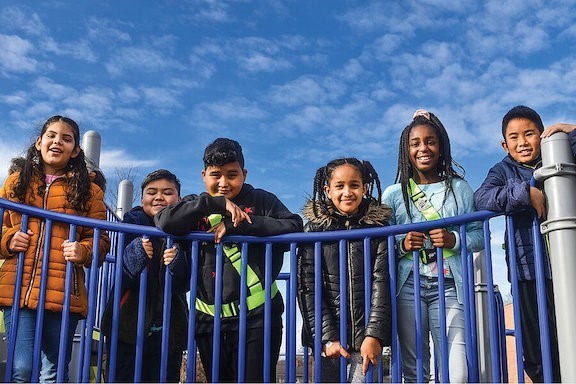 Christina A. Samuels/The Hechinger ReportThese fifth graders in Woodbridge, Virginia – (from left to right) Jashua Alvarado, Ethan Ong, Jason Rivera, Yanet Hundessa, Anjelica Jabbie, and Sam Aphayvong – all want to see a cleaner world in 20 years.
Christina A. Samuels/The Hechinger ReportThese fifth graders in Woodbridge, Virginia – (from left to right) Jashua Alvarado, Ethan Ong, Jason Rivera, Yanet Hundessa, Anjelica Jabbie, and Sam Aphayvong – all want to see a cleaner world in 20 years.
The coronavirus has affected the lives of these children since third grade – Prince William just returned to full-time, in-person learning this school year – but the fifth graders don’t like to imagine the pandemic in their future.
“Let’s hope the pandemic is over,” says Jason Rivera. Other viruses may appear, “but maybe not very big.”
Or maybe there will be more warning, Jashua says. “Scientists would be able to tell if a pandemic is going to come to the world like two years before, or one year, or – I don’t know – months,” she says.
The six students are chatting in an empty classroom at Belmont. They take each question seriously and answer thoughtfully.
That’s perhaps not surprising from a group of students who see themselves playing ambitious roles in building a new world in the future – as engineers, doctors, and scientists.
“My dad’s an engineer, and it seems really cool to build stuff, so I think I want to be an engineer,” Ethan says.
“I’m kind of a science nerd and my mom tells me if I want to be a scientist, I have to be working hard for it,” says Jashua.
Yanet Hundessa and Anjelica will be helping other people. “I really want to be a doctor because I want to help the elderly,” Yanet says.
“I also wanted to be an engineer or a doctor because I love helping people, and I love building things,” says Anjelica.
They also plan to take on problems that grown-ups are now leaving behind. “Why don’t we focus on other people that live in different places?” says Ethan. “There’s people that are poor that don’t have lots of resources and that don’t have food. See, we can turn on water so easily, but other people, they don’t have any.”
That prompts another round of predicting for the day when they’re in charge.
“People could donate to countries that have poor resources,” says Sam Aphayvong. “If the people didn’t get the resources they need, they could become jealous and start wars. If you donate, you can prevent wars and stuff.”
“I think people should be kind to each other,” Yanet says. “No racism, and they should help out poor people and everybody will be equal.” – Christina A. Samuels, The Hechinger Report
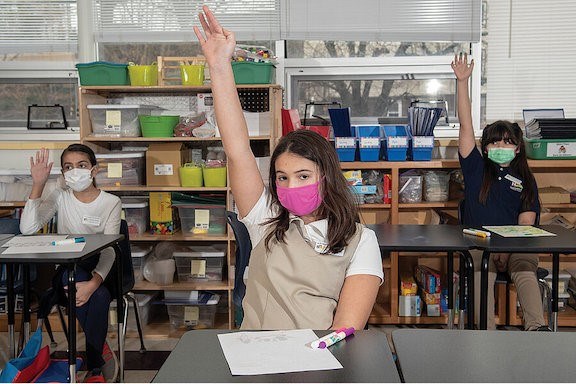 Alfredo Sosa/StaffFifth graders (from left to right) Breelyn Braga, Lydia Vasconcelos, and Marlen Palencia at the International Charter School in Pawtucket, Rhode Island, raise their hands to share ideas on what the world will look like in 2042.
Alfredo Sosa/StaffFifth graders (from left to right) Breelyn Braga, Lydia Vasconcelos, and Marlen Palencia at the International Charter School in Pawtucket, Rhode Island, raise their hands to share ideas on what the world will look like in 2042.PAWTUCKET, R.I. – At the International Charter School in Pawtucket, Rhode Island, a group of nine fifth-grade students gathers in a classroom full of art and writing supplies, with a globe displayed on a corner shelf.
The children serve on their school’s student committee, elected positions, and their duties include representing the school and helping to organize events. On a chilly December morning, that included talking with a Monitor reporter about their aspirations for the world 20 years from now.
For five minutes, the students are quiet as they focus on drawing pictures and jotting notes about what they think will be invented in two decades, when they reach the age of 30. The public charter school they attend in a town just north of Providence serves K-5 students and offers an International Baccalaureate curriculum and dual language immersion programs in English and Spanish or Portuguese. About half the students enrolled are English-language learners.
“I think there’s going to be more machines for recycling and there will be new kinds of spacecraft so you can get to planets like Saturn and Mercury,” says Lydia Vasconcelos, who drew a picture of a recycling machine that separates trash automatically so it’s easier for more people to sort their waste.
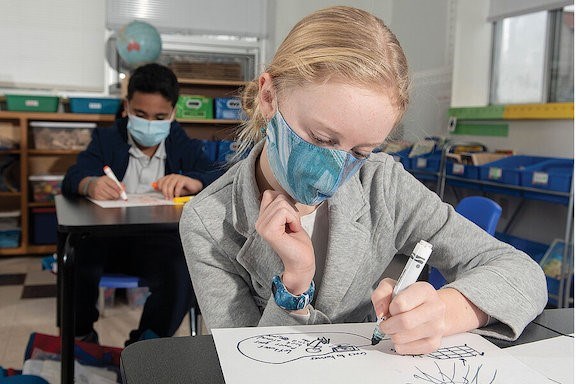 Alfredo Sosa/StaffAnne Hastings, a fifth grader at the International Charter School in Pawtucket, Rhode Island, sketches out her ideas of the future. In 20 years, she wants to run a dance company for children with disabilities.
Alfredo Sosa/StaffAnne Hastings, a fifth grader at the International Charter School in Pawtucket, Rhode Island, sketches out her ideas of the future. In 20 years, she wants to run a dance company for children with disabilities.
Her peer Marlen Palencia is concerned the sky will be “more grayish” in 20 years due to pollution, so she wants to invent a watch that tells people when they are polluting, along with giving them nudges about when to eat and drink so they don’t consume too much or drink too little.
Other classmates agree that they hope more people recycle and take care of the Earth in 20 years, and suggest inventions ranging from electricity that can be reused while watching television, to a machine that mixes up industrial waste areas to make fresh soil.
Breelyn Braga thinks there will be hovering and self-driving cars, something she looks forward to since “I don’t want to run all the way back down the boulevard to get my car; my car just drives to me!”
Wyatt Goldstein thinks we’ll have better spacecraft in 20 years and colonies on Mars. He thinks machines will do more of the mass-producing jobs on Earth, but on Mars, “humans will probably be having the jobs there because we need to be precise.”
Alejandro Roa Martinez agrees that artificial intelligence will likely take over many occupations, but more robot designers, spacecraft engineers, and spaceship drivers will be needed. He’s interested in becoming an engineer who creates “things that help humanity and don’t destroy the world.”
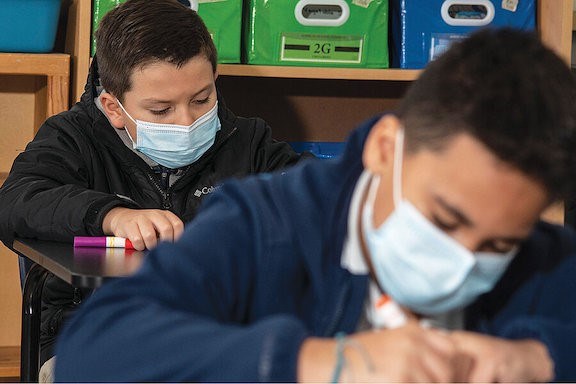 Alfredo Sosa/StaffPedro Daniel Reyes Garcia (front) and Alejandro Roa Martinez, draw their visions of the world in 20 years.
Alfredo Sosa/StaffPedro Daniel Reyes Garcia (front) and Alejandro Roa Martinez, draw their visions of the world in 20 years.
Even with the digital advances the class predicted – like more games and sports played online – many in the class hoped for more in-person social connections in 20 years. Pedro Daniel Reyes Garcia envisions a machine that could make a passport from an identification card in two days instead of a few months. “People could have more chances to get to places so they could visit their families,” he says.
Julia Silva would like to see more schools open around the world so children who can’t afford school or aren’t allowed to go now can access education.
Students spoke about their hopes for world peace, cures for COVID-19, and more equality between people of different races, ethnicities, and genders.
“I hope that in the future there will be more possibilities open to people of different races and gender, because even though we’ve come a long way from where we started, still some jobs aren’t open to just about everyone, and some people are treated differently because of the way they look, act, or feel,” says Anne Hastings, who wants to open a dance company in 20 years for children with disabilities or who have been mistreated.
Other classmates envision becoming game designers, doctors, and engineers. And many of these fifth graders look forward to something more mundane and practical in 20 years – enjoying the simple freedoms of adulthood.
“I hope my life in 20 years will be fun, and I hope I can do stuff that I probably can’t do as a kid like go out by myself and stay with friends till midnight,” says Julia Silva. – Chelsea Sheasley, Monitor staff writer
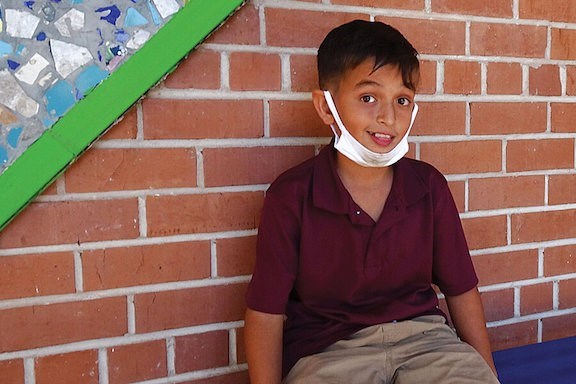 Kathryn Palmer/The Hechinger Report“We all want to be with our families. It just stinks seeing them on a screen and not even being able to talk in person.” – Ronny Tokeak, on why he wants the future to include face-to-face interaction
Kathryn Palmer/The Hechinger Report“We all want to be with our families. It just stinks seeing them on a screen and not even being able to talk in person.” – Ronny Tokeak, on why he wants the future to include face-to-face interaction
TUCSON, ARIZ. – Fifth graders of the future won’t have to wear masks to school every day, but they and everyone else will face big consequences for pollution and bullying.
At least that’s how a handful of fifth graders at John B. Wright Elementary School in Tucson, Arizona, imagine life in 20 years. When this school year started, they were in their third straight year of COVID-19-era learning. They’re mostly attending classes in person now, but many of them suspect that by the time they are in their early 30s, school will be taught entirely online.
“We’ll all have more personal space in 20 years,” says Falhat Hassan on a recent Monday. She also envisions more dramatic changes: a freshly cleaned ocean; a weapon-free, war-free society; and the possibility of holographic teachers. “Everyone will have a new house to live in,” she adds. “It won’t matter how much money you have.”
But what would happen to all of the existing houses? Her classmate Khadija Hamadi says that instead of tearing them down, animals could live in them. And if for some reason there isn’t enough room on Earth, there will be other housing options on the moon.
It’s part of her vision that, in the future, “the whole world will be one big country,” and “no matter where you are from, everybody will get the same stuff.”
For the entirety of Khadija and her fifth grade classmates’ lives, immigration policy has been at the center of national debate. And since growing up in Tucson means living in a diverse college town 60 miles from the U.S.-Mexico border, early exposure to mature conversations about who belongs in this country and who doesn’t is common.
Discussions about how and if schools should teach America’s racist history have also been unavoidable over the past 18 months – even for fifth graders like these. Yet, on this day, they are also simultaneously fantasizing about a world filled with flying cars, virtual clothing, and perhaps no banks (because there may be no paper money).
So, while they do disagree on what type of currency will exist in 20 years and if we’ll be able to time-travel and complete tasks using telekinesis, they are hopeful that in 2042 the color of a person’s skin will matter much less.
“Racism will still be here,” says Jordan Allen, as he sits at a picnic table discussing the future with his classmates, who all acknowledge that bullies like to zero in on the characteristics beyond our control. “But it won’t be as bad as it is now. It will all be taken a lot more seriously.”
On top of that, the world will be a safer place because in 20 years police will rely on mind-reading technology to stop crimes before they happen, such as in the 2002 movie “Minority Report.”
Although Jordan and his peers aren’t sure if their generation will be the one to finally eradicate racism, they are all confident – or hopeful at least – that there will be no pandemic by the time they reach adulthood because scientists will have invented a universal vaccine capable of tackling any virus.
And with that out of the way, they’ll all be able to focus on their jobs. Yes, people will still have to work, but they’ll be more reliant on robots to get hard labor done. According to Ronny Tokeak, the in-demand job in 20 years will be “virtualist” – a person, he explains, who makes sure all the new technology out there is running smoothly.
But when it is time to rest and play, the kids of today expect they will still gather in person to take in a football game, either at a stadium or around a giant TV capable of connecting to a viewer’s brain. By then, Ronny and his classmates predict, women will be as prevalent on the field as men.
No matter how Americans’ leisure and work lives may change in the next 20 years, the fifth graders of 2022 know one thing: They never want to live in a world without face-to-face interaction. “We all want to be with our families,” Ronny says. “It just stinks seeing them on a screen and not even being able to talk in person.” – Kathryn Palmer, Monitor correspondent
This story was produced in partnership with The Hechinger Report, a nonprofit, independent news organization focused on inequality and innovation in education.
Page created on 1/3/2022 4:40:09 PM
Last edited 1/3/2022 7:30:38 PM
